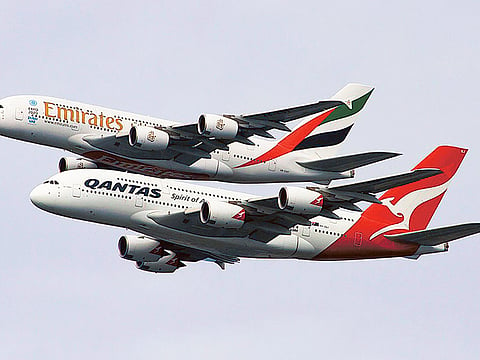Emirates to extend Qantas partnership beyond 2018
Any extension to partnership is likely to come under the scrutiny of Australia’s competition watchdog

London: Emirates will seek to extend the historic partnership it launched with Australia’s national airline, Qantas, in 2013 beyond the initial five year period, airline President Tim Clark said in an interview in London on Friday.
“I see no reason why we won’t continue with the arrangement,” Clark told Gulf News.
Two years ago, Emirates and Qantas entered into a revenue sharing partnership that saw the Australian carrier end a 17-year relationship with British Airways and move its London-bound stop over from Singapore to Dubai.
“It’s a good story, we’re very pleased with it,” Clark said.
Under the agreement, Emirates gains access to around 50 points in Australia through Qantas’ domestic network. In return, Qantas connects onto Emirates flights to more than 70 destinations across Europe, the Middle East and Africa.
“It’s doing really well at the moment. We’re filling our aeroplanes up, they’re filling our [aeroplanes and] we’re putting a lot on their domestic network,” Clark said.
The two airlines can also coordinate maintenance and crew training, combine purchasing power when buying goods including fuel and have reciprocal frequent flyer programmes, meaning passengers can redeem points with either carrier, as part of the partnership.
Any extension to partnership is likely to come under the scrutiny of Australia’s competition watchdog, the Australian Competition and Consumer Commission (ACCC). In 2013, the ACCC granted conditional approval to partnership that included permitting the deal for five years, not the ten years Emirates and Qantas were seeking.
The ACCC could not be reached for comment.
But the partnership has received bi-partisan support from both sides of Australian politics. Last week, on a visit to the UAE, Australia’s Trade Minister, Andrew Robb from the Liberal Party, hailed the tie-up between the two airlines. In 2013, then-Transport Minister, Anthony Albanese from the Labor Party, drafted a submission to the ACCC in favour of the deal.
Meanwhile, Clark believes that any extension will be a simple formality.
“As long as [Qantas Chief Executive] Alan Joyce is there and I’m here at Emirates and the Emirates team is working closely together with Qantas [then] it will just be a continuation,” he said.
Qantas could not be reached for comment; however, Joyce has previously spoken in favour of the partnership.
Australian seats
Clark said the partnership “is really good for both companies’ and believes there is demand to add more capacity on the Dubai-Australia route.
“Getting onto any of our Australian aircraft, you’ve got to be heroic to get a seat because we just don’t seem to have any [empty seats]. We need more [Airbus] A380s going to Australia,” he said after announcing a $9.2 billion (Dh33.7 billion) Rolls-Royce engine order for 50 A380s.
Emirates operate 93 flights a week to Australia, Clark said. Qantas operates two daily flights to Dubai, one each from Melbourne and Sydney, and two daily flights from Dubai to Australia.
Emirates model not changing
Following the launch of the Emirates-Qantas tie-up there was speculation that Emirates would take a minority stake in the Australian carrier. On a number of occasions, including after Qantas successfully lobbied the Australian government to increase the cap of investment by a foreign airline to a 49 per cent stake; Emirates said it was not interested.
On Monday, when asked that after 30 years of organic growth whether the airline would adapt its business model, Clark said there is “plenty more to do on the same business model”.
“I don’t think we have to go into a low cost operation or an M&A [mergers and acquisition] programme,” he said.
Sign up for the Daily Briefing
Get the latest news and updates straight to your inbox



